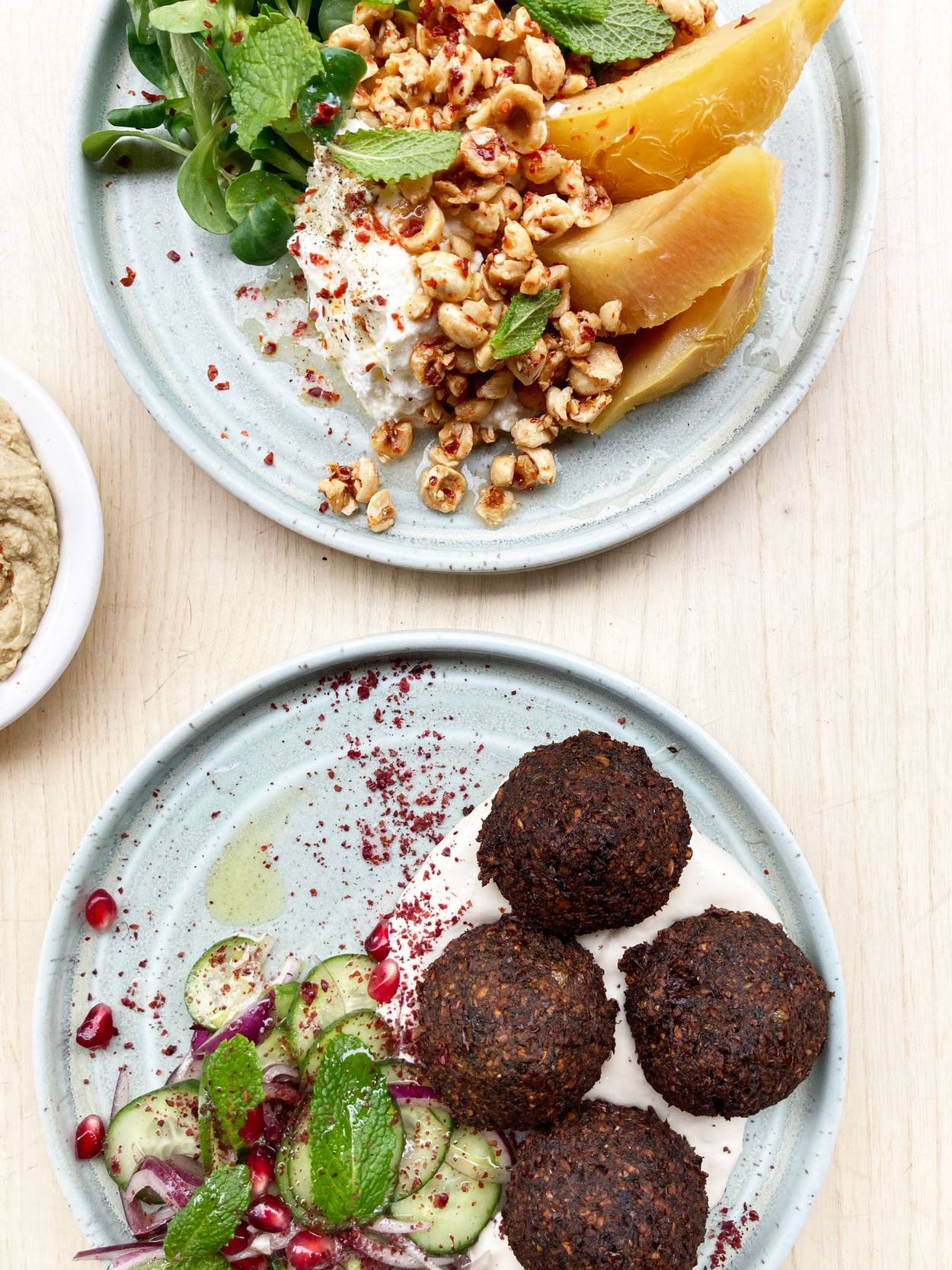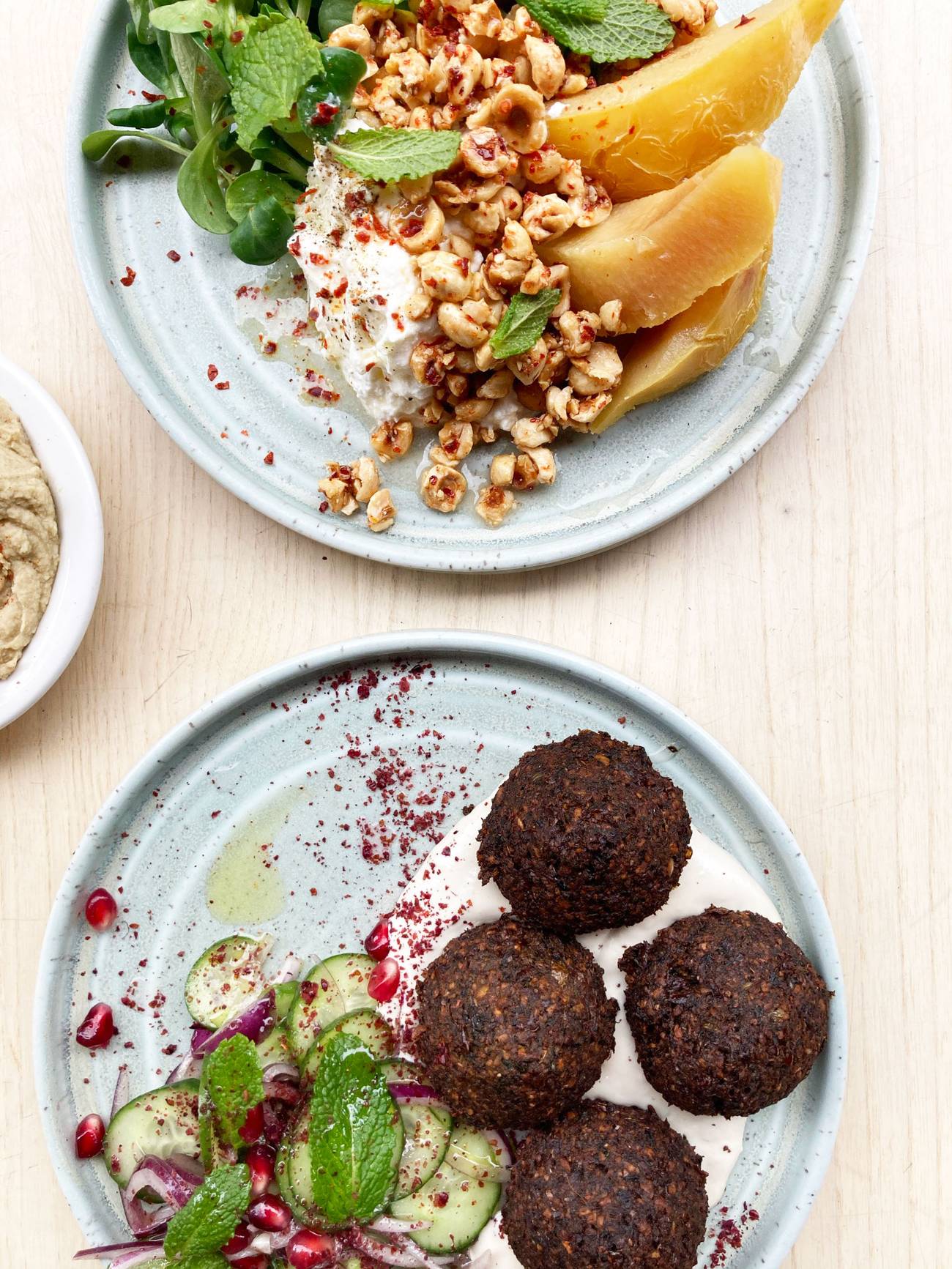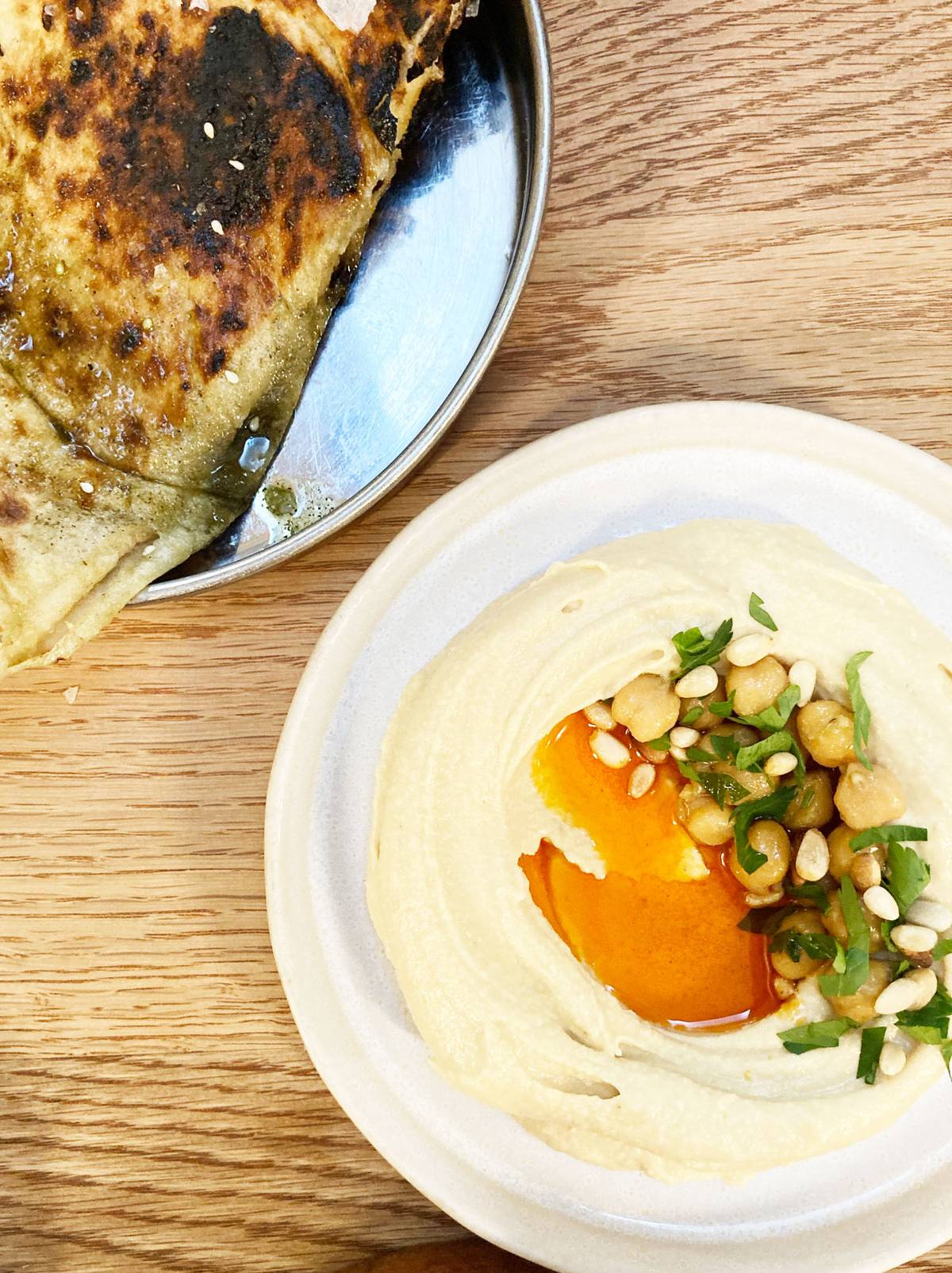Tel Aviv on the Thames
Israeli and Middle Eastern restaurants change what’s on the menu in London




Inside the restaurant, a parade of dishes makes its way to my table. There’s griddled halloumi sitting in a pool of fragrant nigella seed honey. There is fried eggplant drizzled with fiery z’hug and date syrup. Next comes a plate of creamy hummus, its surface shimmering with browned butter, and a plate of chewy laffa for dipping. Between bites, I sip a sparkling kiwi gazoz, decorated with a botanical garden’s worth of fresh sage leaves and dried rose petals.
With my eyes closed, I might imagine I’m at a fashionable new eatery on Dizengoff Street. But I am not in Tel Aviv, I am at Bubala—a bustling, Middle Eastern-inspired restaurant in London. Opened in 2019 in the historically Jewish neighborhood of Spitalfields (a second location is set to open in Soho later this year), Bubala offers a delicious peek into London’s full-blown obsession with modern Israeli and Middle Eastern food.
Over the past two decades, Mediterranean-inspired cuisine has permeated all levels of London’s dining scene. There are fast casual spots like Sababa Station, and hole-in-the-wall kosher eateries like Balady Alaesh, where the crispy, green-flecked falafel is far tastier than it needs to be. There are buzzy, nightlife-inspired joints like Bala Baya, and elegantly fashionable fine dining spots like The Palomar, where the pillowy kubaneh has become local culinary canon. There’s the pita stand Shuk in London’s beloved Borough Market (where the silky eggplant sabich and hazelnut-chocolate babka are as good as anything you can find in Tel Aviv), and a Middle Eastern-inspired steakhouse, The Black Cow, that serves its charcoal-grilled steaks alongside harissa-slathered fries and grilled corn with briny feta.
London is hardly the only city to catch a fever for the bold flavors of the Mediterranean. In New York City, where I live, there are a bevy of modern Israeli and Middle Eastern-inspired eateries to choose from. And the same could be said for cities from Los Angeles to Berlin. But there is something extra going on in London. Theirs is a next-level infatuation that transcends trendiness. In London, modern Israeli food has become an inextricable part of the dining landscape.
Yotam Ottolenghi has something to do with it—quite a lot, actually. The Israeli-born chef and his business partner, the Palestinian chef Sami Tamimi, opened their first restaurant, Ottolenghi, in 2002 in London’s Notting Hill neighborhood. It did not take long for the city’s diners to fall for their fresh and inventive approach to cooking, or their generous hand with rose water, pomegranate molasses, labneh, za’atar, and other gifts from the Middle Eastern pantry.
Today, Ottolenghi is the establishment—not in a stuffy or exclusive way, but in terms of cultural ubiquity and influence. In addition to his many restaurants (which remain bustling 20 years on, and despite the blows of the pandemic), and his team’s many cookbooks, he is a weekly recipe columnist for The Guardian. And the spices and other ingredients he and Tamimi introduced are now commonly found in Waitrose and other London supermarkets. “He is the father of modern Israeli cuisine in London,” said Victoria Prever, food editor for The Jewish Chronicle. “He blazed the trail.”
As Ottolenghi’s star continued its meteoric rise, its light began to radiate outward to other chefs, including alumni of his company. In 2004, the husband-and-wife chefs Itamar Srulovich and Sarit Packer relocated to London from Israel. They were eager to move on from their home country’s food scene, which, at the time, was still rather limited. Before long, they began working at Ottolenghi. “Working there was a revelation,” Srulovich told me. “We left Israel to cook the cuisines of the world, but we saw there how much people cherished the food we had grown up eating. It had resonance for them just like any other cuisine.”
Srulovich described the working environment at Ottolenghi as “embryonic”—a supportive place that encouraged chefs to contribute and grow. “Working with Yotam was a joy, and just by being near Sami you become a better person,” he said. In 2012, Sruolvich and Packer branched out on their own, opening Honey & Co.—a petite spot with a sunny vibe and a vibrant Middle Eastern-inspired menu to match. Of everything I ate on a recent trip to London, Honey & Co.’s poached quince served over creamy curd cheese and showered with spiced honey and hazelnuts was the most memorable.
Srulovich and Packer have since opened two other establishments: the Middle Eastern deli and provisions shop Honey & Spice and the grill house Honey & Smoke, which serves dishes like charred tuna skewers with preserved lemon and coriander chermoula, and grilled lamb with baba ghanouj and griddled bread. After 10 years, the original Honey & Co. location will close in May. But while saying goodbye to their first restaurant baby is bittersweet, Srulovich said he and Packer see the closing as a chance to pause and refocus before reopening at a new site in a new neighborhood in June.

While Ottolenghi’s influence on London’s dining scene cannot be overstated, it is not the only factor. The U.K. is home to 25,000 Israelis, a number that is both at an all-time high, and growing at a rapid clip. In a city hardly known for its abundance of sunshine, having access to such a sunny cuisine in London can serve as a balm for homesick Israelis. The city is also home to sizable non-Jewish Turkish and Lebanese populations, whose restaurants and markets have also helped whet London’s appetite for kebabs and lahmacun, kibbeh and baba ghanouj.
Meanwhile, the ties between Britain’s Jewish population and Israel are both geographically and emotionally close. Marc Summers, who founded Bubala in partnership with chef Helen Graham, is an Ashkenazi Londoner through and through. His grandfather grew up around the corner from where the restaurant now sits, and Summers was raised eating cholent, chopped liver, and other European Jewish staples. But every year, Summers’ family spent their annual holidays in Tel Aviv and Eilat. “That was when I first truly started to appreciate Middle Eastern food,” Summers said. Today, a chef-y riff of his family’s potato latkes is included on the menu at Bubala. But nearly everything else on the vegetable-forward menu skews breezy and Mediterranean.
Diners across the spectrum are, quite literally, eating it up. Modern Israeli and Middle Eastern restaurants routinely top the city’s “best of lists,” with new spots—like the upscale restaurant Jeru from chef Roy Ner—opening up all the time to critical and public acclaim. “When we opened Honey & Co., Middle Eastern food felt like a trend in London,” Srulovich said. But the cuisines of the Mediterranean have proven to have impressive staying power.
“London has a barometer for what is cool, but also enduring,” said Layo Paskin, who founded The Palomar in 2014 with his sister Zoe. (They also own the North African-inspired restaurant The Barbary, and several other well-loved London eateries.) “There are certain foods where you have them once and don’t crave them again for six months. This is food you want to eat every week.”
Like all big cities, London is a cultural crossroads with a globally influenced dining scene to match. But as Paskin said, Middle Eastern cuisine has “become part of the city’s culinary horizon.” Other flashy cuisines may come and go. But the silky, smoky appeal of charred eggplants and the mouth-puckering delights of preserved lemons are here to stay.